第十二讲否定句的翻译
- 格式:ppt
- 大小:196.00 KB
- 文档页数:25



新概念英语第二册第12课课文讲解单词学习luck n. 运气,幸运captain n. 船长sail v. 航行harbour n. 港口proud adj. 自豪important adj. 重要的★luck n. 运气, 幸运good luck 祝你好运bless you 保重(比如在别人打喷嚏时说的话)lucky adj. 幸运的lucky dog 幸运儿lucky day 幸运日It’s my lucky day. 今天我真幸运luckily adv. 幸运地unlucky adj. 不幸的★captain队长,船长captain+人名,表示“某队长/船长”★sail v. 航行①vi. (船)航行,扬帆行驶The ship is sailing for New York. 这条船正驶向纽约②vi. (人)乘船航行I want to sail around the world. 我想乘船环球旅行③n. 帆,篷This boat has white sails. 这个船的帆是白色的★proud adj. 自豪,自满①be proud of 以……为自豪,为(某人)感到自豪Parents are proud of their children. 父母为自己的孩子感到自豪②be pround to do sth很骄傲的做某事I am pround to call you my friend.我很骄傲地称你是我的朋友。
pride n. 自豪have/take pride in 以……为自豪He has great pride in his ability. 他对自己的能力感到(非常) 骄傲We take a lot of pride in our country.我们为我们的国家感到自豪。
★important adj. 重要的The matter is important to us. 那件事对我们很重要It is important for you to do that. 对你来说,做那件事是很重要的importance n. 重要,重要性She stressed the importance of this work. 她强调了这个工作的重要性课文讲解:1.Our neighbour, Captain Charles Alison, will sail from Portsmouth tomorrow. 我们的邻居查尔斯·艾利森船长明天就要从朴次茅斯启航了。

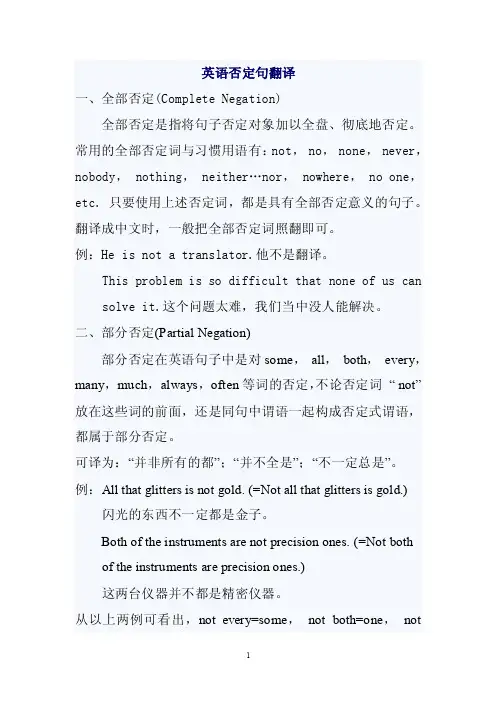
英语否定句翻译一、全部否定(Complete Negation)全部否定是指将句子否定对象加以全盘、彻底地否定。
常用的全部否定词与习惯用语有:not, no, none, never,nobody, nothing,neither…nor, nowhere, no one,etc. 只要使用上述否定词,都是具有全部否定意义的句子。
翻译成中文时,一般把全部否定词照翻即可。
例:He is not a translator.他不是翻译。
This problem is so difficult that none of us can solve it.这个问题太难,我们当中没人能解决。
二、部分否定(Partial Negation)部分否定在英语句子中是对some,all,both,every,many,much,always,often等词的否定,不论否定词“ not”放在这些词的前面,还是同句中谓语一起构成否定式谓语,都属于部分否定。
可译为:“并非所有的都”;“并不全是”;“不一定总是”。
例:All that glitters is not gold. (=Not all that glitters is gold.) 闪光的东西不一定都是金子。
Both of the instruments are not precision ones. (=Not bothof the instruments are precision ones.)这两台仪器并不都是精密仪器。
从以上两例可看出,not every=some,not both=one,notalways=sometimes,not wholly=in some degree not together=somewhat.三、双重否定(Double Negation)双重否定是指两个否定词并用,否定同一个单词,或者一个否定词否定另一个否定词,其否定意义互相抵消得到肯定意义。
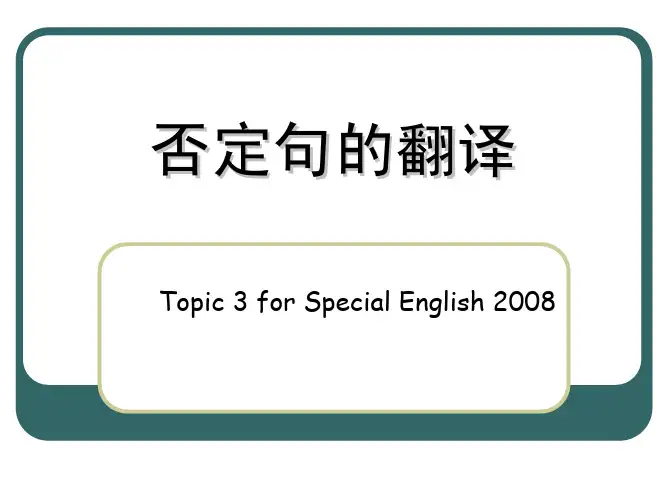

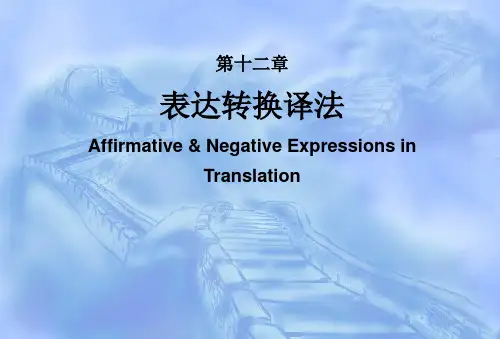

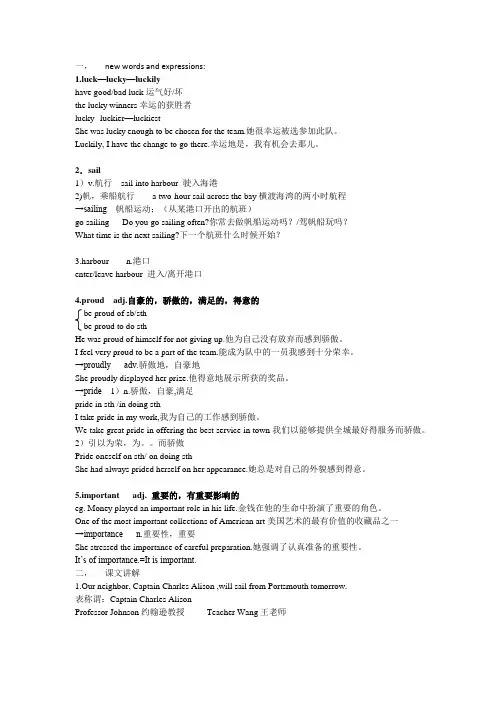
一,new words and expressions:1.luck—lucky—luckilyhave good/bad luck运气好/坏the lucky winners幸运的获胜者lucky--luckier—luckiestShe was lucky enough to be chosen for the team.她很幸运被选参加此队。
Luckily, I have the change to go there.幸运地是,我有机会去那儿。
2.sail1)v.航行sail into harbour 驶入海港2)帆,乘船航行 a two-hour sail across the bay横渡海湾的两小时航程→sailing 帆船运动;(从某港口开出的航班)go sailing Do you go sailing often?你常去做帆船运动吗?/驾帆船玩吗?What time is the next sailing?下一个航班什么时候开始?3.harbour n.港口enter/leave harbour 进入/离开港口4.proud adj.自豪的,骄傲的,满足的,得意的be proud of sb/sthbe proud to do sthHe was proud of himself for not giving up.他为自己没有放弃而感到骄傲。
I feel very proud to be a part of the team.能成为队中的一员我感到十分荣幸。
→proudly adv.骄傲地,自豪地She proudly displayed her prize.他得意地展示所获的奖品。
→pride 1)n.骄傲,自豪,满足pride in sth /in doing sthI take pride in my work,我为自己的工作感到骄傲。
We take great pride in offering the best service in town我们以能够提供全城最好得服务而骄傲。
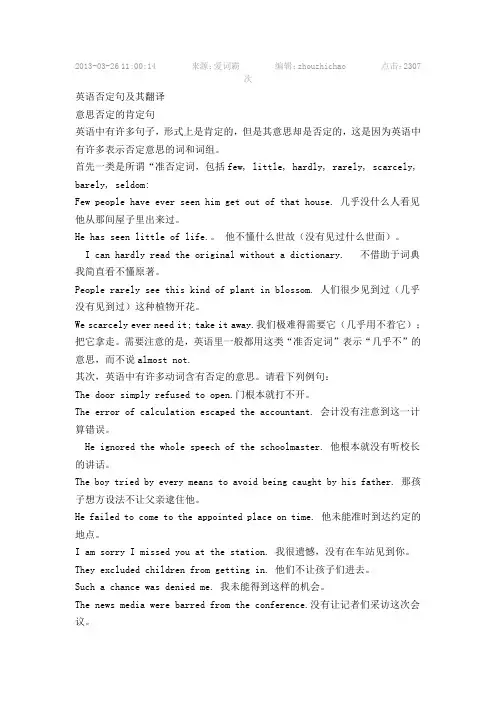
2013-03-26 11:00:14 来源:爱词霸编辑:zhouzhichao 点击:2307次英语否定句及其翻译意思否定的肯定句英语中有许多句子,形式上是肯定的,但是其意思却是否定的,这是因为英语中有许多表示否定意思的词和词组。
首先一类是所谓“准否定词,包括few, little, hardly, rarely, scarcely, barely, seldom:Few people have ever seen him get out of that house. 几乎没什么人看见他从那间屋子里出来过。
He has seen little of life.。
他不懂什么世故(没有见过什么世面)。
I can hardly read the original without a dictionary. 不借助于词典我简直看不懂原著。
People rarely see this kind of plant in blossom. 人们很少见到过(几乎没有见到过)这种植物开花。
We scarcely ever need it; take it away.我们极难得需要它(几乎用不着它);把它拿走。
需要注意的是,英语里一般都用这类“准否定词”表示“几乎不”的意思,而不说almost not.其次,英语中有许多动词含有否定的意思。
请看下列例句:The door simply refused to open.门根本就打不开。
The error of calculation escaped the accountant. 会计没有注意到这一计算错误。
He ignored the whole speech of the schoolmaster. 他根本就没有听校长的讲话。
The boy tried by every means to avoid being caught by his father. 那孩子想方设法不让父亲逮住他。
If you had come to my place, I would have told you about it.如果你那时到我这儿来,我是会告诉你的。
(这句话表示事实上的否定,意为“你没有到我这儿来,我也没有告诉你。
”It seemed as if he were trying to teach us all he knew in one class.看起来他好像想把自己所有的知识在一堂课内都教给我们。
(事实上,不可能将所有的知识在一堂课内教授)If only 与过去完成时连用时,表示同过去事实相反的主观设想,同样含有否定的意味,通常翻译成“要是……该多好啊”。
If only you had worked with great care! 你要是更仔细一些该多好啊!If only you had told me before. 要是你早告诉我就好了。
If only he hadn’t driven so fast.他没把车子开得这么快就好了。
8. 介词表示否定英语中介词的使用是相当活跃的,其中有些介词同样表达否定的意义,如from, off, of, in, without, for, above, beyond, past, out of, against, beside, 等等。
He is against the plan. 他反对这个计划。
He is out of work. 他失业了。
Good advice is above/ beyond/ without price. 好的建议是无价的。
This strange idea is beyond belief. 这种奇怪的想法令人难以置信。
I can see nothing without my glasses. 不戴眼镜我什么都看不见。
She is still in two minds. 她还没拿定主意。
I am off duty today. 我今天不值日。
【导语】学习英语并不难啊。
你还在为英语成绩低拖后腿⽽烦恼吗?不要着急,⽆忧考⼩编为⼤家提供了新概念英语第⼆册第12课课⽂详解及语法解析。
相信加⼊学习当中的你,很快便不再受英语的困扰!还在等什么?和⼩编⼀起来学习吧! 课⽂详注 Further notes on the text 1.Our neighbour, Captain Charles Alison, will sail from Portsmouth tomorrow. 我们的邻居查尔斯·艾利森船长明天就要从朴次茅斯启航了。
(1)这个句⼦以及本课的⼤部分句⼦⽤的是⼀般将来时(cf. 本课语法) (2)句⼦的主语部分our neighbour 和Captain Charles Alison为同位语。
(cf. 第4课语法)下⽂ He will be in his small boat,Topsail 中的Topsail 也为同位语。
2.We'll meet him at the harbour early in the morning. 明天⼀⼤早我们将在码头为他送⾏。
在表⽰时间的短语 in the morning, in the afternoon等前⾯可以再加上early, late等副词,以便更确切地表⽰时间: Tony will arrive late in the afternoon. 托尼下午晚些时候才能抵达。
3.Topsail is a famous little boat. “涛波赛”号是艘有名的⼩艇。
little除了表⽰形体上⼩的意义之外,还含有“可爱”的意思,是个带有感*彩的词。
如little Tom(⼩汤姆)就有⼀种亲昵的味道。
4.It has sailed across the Atlantic many times. 它已经多次横渡⼤西洋。
across 是对某个细长物“横切”、“横断”、“横渡”等,尤指河流、马路等等。